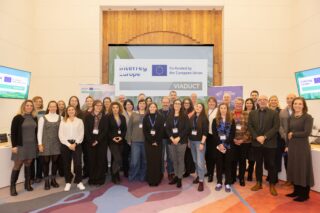The world of work has been changed in Sligo and across the west forever by Covid-19. A recent study by the Western Development Commission found that 94% of people are now in favour of working remotely on an on-going basis. However, the same study cited difficulties for some who would prefer to work from home part-time, from the office one or two days a month and the rest in a shared working environment or a hub. This is the emerging trend of a new hybrid model of work.
Looking globally, Facebook has said that 50% of its jobs will be remote within 10 years, Twitter is letting almost all its global workforce work from home forever, google staff can work remotely until July 2021, Microsoft, Slack, Airbnb and the list goes on. The question is, how can the West of Ireland respond?



More than 16 months before Covid-19, The Western Development Commission had begun investigating the opportunities for remote working along the Atlantic Economic Corridor (Donegal to Kerry) and set out to map every hub already in operation or in planning. The assumption was that there would be around 30 hubs but in fact, the WDC research found there are over 100 already in operation. The Atlantic Economic Corridor Hubs Project was created to establish a community network between these hubs, identify their challenges, provide support, training, and drive footfall to the hubs in every rural town and village across the west.
Successful, well-managed hubs can help start-ups grow, bring together talent and develop a professional community that helps foster business connections and investment opportunities. Supporting these hubs is an ideal tool for rural and regional development because it offers access to high-speed broadband, brings more people into town centres, reduces the need for long commutes and offers our workforce a better work/life balance
says Allan Mulrooney, WDC Head of Communications and AEC Project Development.
From digital nomads to entrepreneurs, the profile of a hub user is diverse and in the last few months has grown to be much wider. A new cohort of workers are choosing to live and work locally, some prompted by the WDC’s More To Life campaign, accessing these hubs and supporting the community and rural regeneration. The Atlantic Economic Corridor Hubs project is now ready to help support the hub community and build on the work of hub managers up and down the region by launching a new strategy, a suite of online ICT systems, including a state of the art booking system and a brand new marketing campaign to reach the diverse audience. The project is supported by an AEC officer in each county working for the local authority.
“We have all just been through the biggest work-life experiment in decades, rather than feeling hindered, our team are working hard to develop solutions for the west of Ireland and we believe the hub network will play a key part in that” explained AEC Hubs Programme Manager Stephen Carolan. “Over the past 16 months we have carried out research with the hubs to identify their needs and we are now ready to launch a number of new initiatives which will support growth in the hubs and have a knock-on effect across the region. Our recent Hub Outreach Scheme supported 65 hubs to reopen during Covid-19 by supplying funding for essential safety measures. Our new online platform and booking engine, which will launch in January will allow users to seamlessly book a hub across the region instantly and our new campaign will target those working from home, multinationals who have staff now working across the region, those looking to make a move west or even take a trip along the AEC for a working holiday.”

Allan Mulrooney concludes by saying; “In early January we will launch our AEC hubs Strategy which we believe offers an opportunity to revitalise the towns and villages of Ireland’s Atlantic coast. The offering will support a new era of remote and flexible work and help to sustain local communities which will be achieved through collaboration combined with leading technology and data”
For more information on remote working hubs in the AEC, you can visit www.atlanticeconomiccorridor.ie





